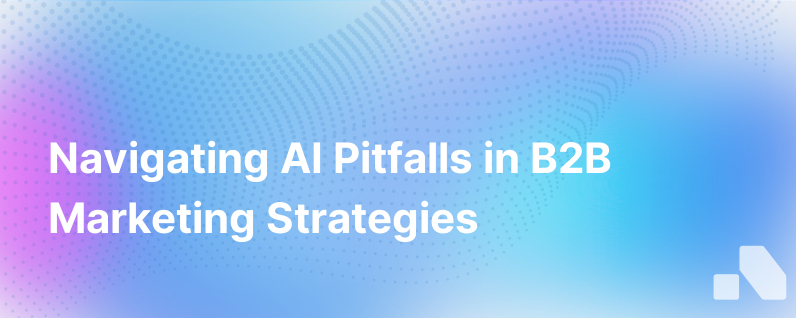Pitfalls And Solutions For Using Artificial Intelligence In B2B Marketing
Published on December 21, 2023 by David Zhang
In the realm of B2B marketing, artificial intelligence (AI) has become something of a modern panacea—a versatile, powerful tool promising to transform and supercharge strategies, convert leads more efficiently, and personalize the customer experience beyond our wildest dreams. However, amidst the enthusiasm, it’s essential to recognize that the implementation of AI in B2B marketing is not without its pitfalls. Understanding these challenges and navigating them with strategic solutions is crucial for businesses aiming to leverage AI effectively and ethically.
Pitfall 1: Data Quality and Quantity Challenges
Quality data is the bedrock upon which AI systems stand. AI-driven tools rely on vast datasets to learn, make predictions, and perform actions. If the data fed into an AI system is poor, plagued with inaccuracies, or insufficient, the output will be equally flawed.
Solution: Investing in robust data collection and management practices is key. Businesses should actively clean, maintain, and augment their databases to ensure the AI has the best chance of delivering reliable insights. Also, implementing data governance that ensures quality and consistency is not just a one-time effort; it is an ongoing commitment.
Pitfall 2: Lack of Understanding and Trust
AI can seem like a black box to those who aren't data scientists or AI experts, which can lead to skepticism and resistance among marketing teams.
Solution: Education and transparency are vital. Offering training for your marketing teams to understand the basics of AI, and how it applies to their work can build trust and help them to feel more comfortable engaging with AI tools. Transparency in terms of how AI’s decisions are made and its limitations leads to better adoption and trust in the system.
Pitfall 3: Overreliance on Automation
AI can automate many marketing tasks, but an overreliance on automation can lead to neglecting the human element that is often necessary for B2B relationships.
Solution: Balance is pivotal. Use AI to handle repetitive tasks like data analysis, lead scoring, and basic customer service inquiries, but keep humans at the helm for nurturing complex customer relationships and making strategic decisions.
Pitfall 4: Ethical Concerns and Bias
AI is only as unbiased as the data it’s trained on. Historical data can be riddled with biases that, when funneled into an AI system, can amplify discrimination or ethical issues.
Solution: An ethical framework for AI use in B2B marketing should be developed. Training AI on diverse data sets and regularly auditing the algorithms for biased outcomes can help prevent embedding unethical biases into marketing practices. Moreover, it's crucial to design AI systems with explainability in mind so that its decision-making process can be understood and interrogated by humans.
Pitfall 5: Difficulty in Personalizing at Scale
One promise of AI in B2B marketing is high-level personalization at scale. However, achieving this requires a nuance that AI systems sometimes fail to capture, resulting in personalization that feels artificial or misses the mark.
Solution: Solutions here involve a mix of better data segmentation, constant refinement of personalization algorithms, and a feedback loop from clients to understand where personalization adds value and where it falls short. Moreover, personalization strategies should be aligned closely with customer relationship management to ensure that personalized content is meaningful and contextually relevant.
Pitfall 6: Setting Unrealistic Expectations
AI has limitations and setting unrealistic expectations for what AI can achieve in B2B marketing can lead to dissatisfaction and wasted investment.
Solution: Set clear, attainable objectives for your AI implementations, and be open to iteratively adapting your strategies. Understand that AI is a tool that complements human insight rather than replacing it entirely.
Pitfall 7: Integration and Interoperability Issues
The best AI algorithms are of little use if they cannot integrate seamlessly with existing marketing systems and software or cannot communicate with other AI systems (interoperability).
Solution: When choosing AI tools and platforms, look for those with open APIs and a track record of easy integration. Building an IT architecture that supports flexibility and connectivity is a fundamental step for successful AI adoption.
Pitfall 8: Ignoring Customer Privacy and Regulation
AI in marketing relies heavily on customer data, which can raise concerns about privacy and regulatory compliance, especially with regulations such as GDPR in place.
Solution: Put customer privacy at the forefront by adopting a privacy-by-design approach, stay up to date with regulatory changes, and build compliance checks into your AI solutions. Ensure that your AI tools have proper safeguards to handle personal data sensitively and ethically.
Conclusion
Artificial intelligence offers B2B marketers an unprecedented opportunity to elevate their strategies. However, as with any transformative technology, deploying it successfully comes with its own set of challenges. By staying aware of these pitfalls and actively seeking out solutions—as outlined—we can ensure that the implementation of AI in B2B marketing is effective, personal, ethical, and compliant. As AI continues to evolve, so must our strategies for its use.
Businesses like Aomni, that understand the intricacies of B2B sales and AI, are shaping the market by offering AI-powered solutions that address these very challenges—helping to sell more strategically, with real-time insights and personalized content that can transform an AI-equipped marketing strategy from a rough diamond into a meticulously cut gem.